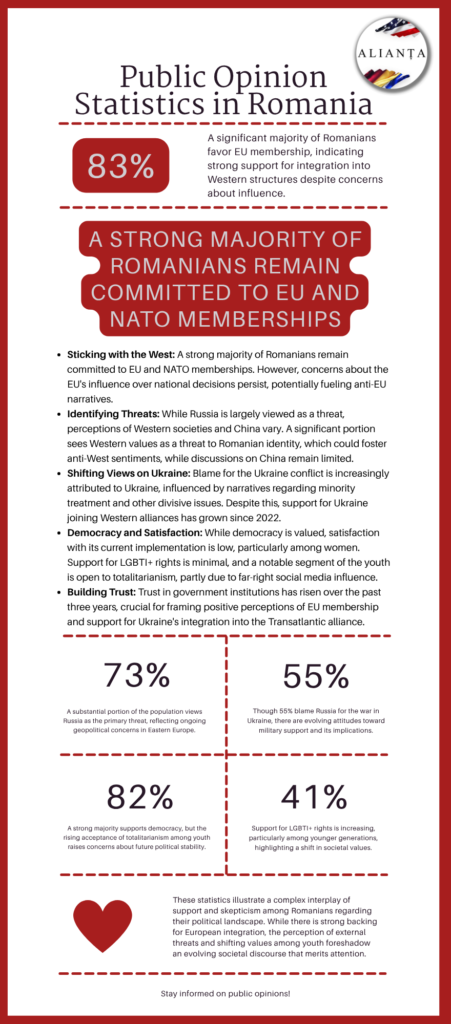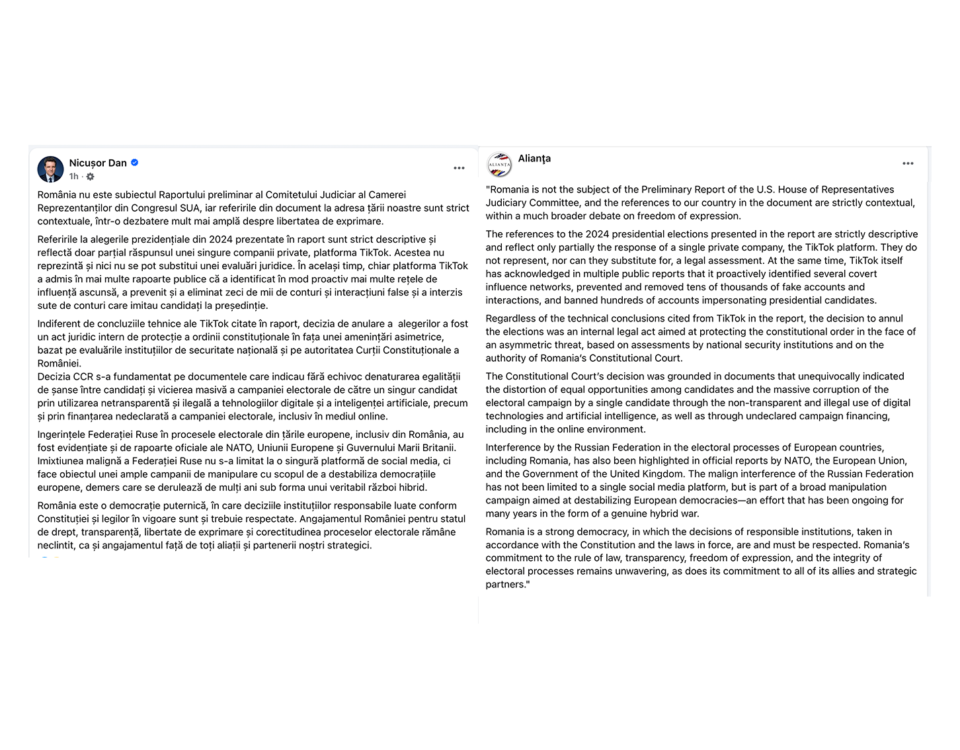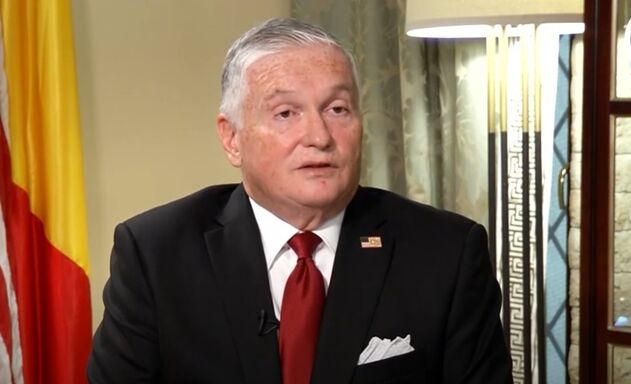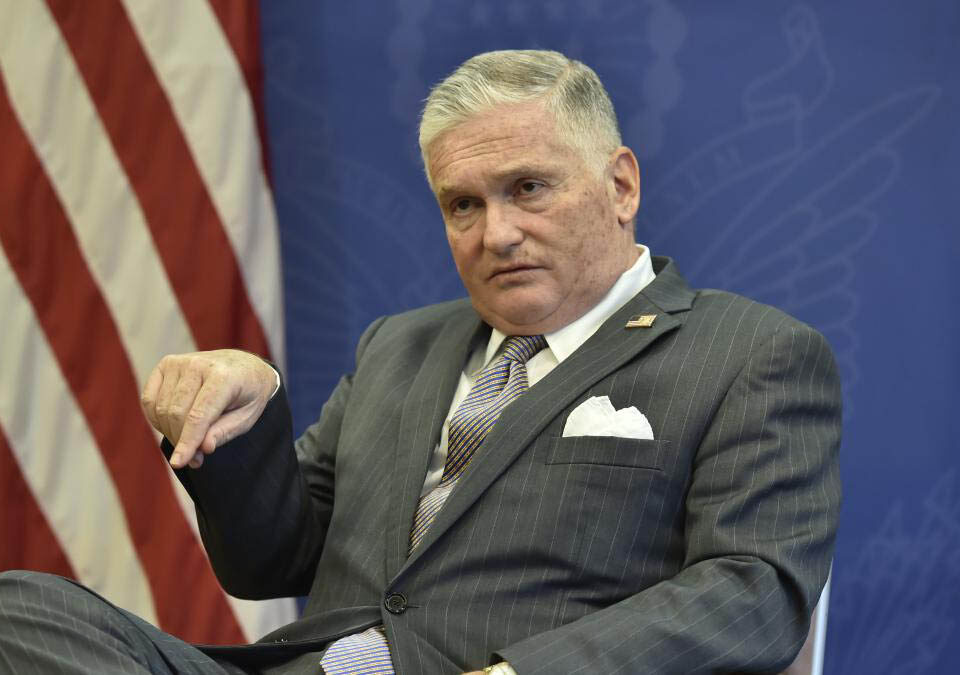Romania stands at a pivotal moment in its relationship with the West. According to the latest GLOBSEC 2024 Trends report, public opinion in Romania remains overwhelmingly supportive of membership in the European Union (EU) and NATO, yet underlying doubts and the rise of anti-West narratives present new challenges for Romania’s democratic future and its role as a strategic ally.
Strong Support for EU and NATO – But Lingering Frustrations
The data shows that 83% of Romanians support EU membership, and an even higher 88% back NATO participation. These numbers have largely recovered from the dip seen during the COVID-19 pandemic and underscore Romanians’ enduring belief that their country belongs firmly in the Western institutional system.
However, the report also reveals growing frustration: more than 70% of Romanians feel that the EU dictates policies without giving the country enough influence. This perception—whether accurate or not—creates fertile ground for Eurosceptic narratives. Additionally, Romania’s delayed full integration into the Schengen Area continues to fuel feelings of being treated as “second-rate EU citizens.” Addressing this perception is critical, as it can erode trust in European institutions and weaken Romania’s pro-Western orientation.
NATO and Security in the Black Sea Region
Romania’s strategic role in NATO is expanding rapidly. With the Mihai Kogălniceanu Airbase soon becoming NATO’s largest military base in Europe, Romania is poised to play a central role in regional security. 74% of Romanians believe NATO membership decreases the likelihood of foreign attack, and trust in national armed forces strongly correlates with confidence in NATO. However, female respondents showed slightly less confidence in NATO’s protective role, indicating a need for better communication tailored to different demographics.
Russia as the Main Threat – But Shifting Perceptions on Ukraine
Unsurprisingly, Russia is widely perceived as the primary threat to Romania’s security. But a concerning trend emerged in 2024: fewer Romanians blame Russia for the war in Ukraine compared to 2023. Disinformation and narratives about Ukraine’s treatment of minorities have gained traction, amplified by far-right parties like AUR and SOS Romania. Despite this, more Romanians now support Ukraine joining the EU and NATO than in 2022, signaling that Romania’s pro-Western stance remains resilient.
Democracy and Values – Support in Theory, Ambivalence in Practice
Romanians overwhelmingly value democracy as a system based on human rights and the rule of law. Yet over a third of respondents—especially youth—believe a totalitarian system might be good for the country. This paradox highlights the influence of populist narratives and social media on younger generations.
The 18-34 age group is particularly complex: they are the strongest supporters of EU membership and LGBTI+ rights but also the most likely to view NGOs as “foreign agents” and express sympathy for illiberal ideas. This generational ambivalence signals an urgent need to engage youth with credible information and policies that address their economic insecurities.
Trust as the Key to Strengthening Western Alignment
Trust in Romanian institutions has grown significantly in the past three years, rising to 48% for the government and 44% for Parliament. This is critical, as the study shows that those who trust institutions are more likely to support EU and NATO membership and endorse closer integration with the West. Civic engagement, transparency, and effective governance remain essential for reinforcing these positive trends.
Recommendations – Building Resilience Against Anti-West Narratives
The GLOBSEC report outlines several recommendations highly relevant to Alianta’s mission of strengthening U.S.-Romania relations:
- Improve Understanding of the EU: Civic and media actors must communicate more clearly how Romania participates in EU decision-making. Dispelling the “EU dictates to us” narrative is crucial.
- Engage Youth Directly: With young people more susceptible to populist and anti-democratic messages, proactive engagement is essential. Education, job opportunities, and digital literacy programs can strengthen their confidence in democratic systems.
- Open Dialogue on Romanian Minorities in Ukraine: Transparent discussions can counter far-right narratives and build trust between Romanian and Ukrainian communities.
- Address Perceptions of China: Public discourse should explain the economic and security risks associated with China, which remains underexplored in Romanian public debates.
- Promote Civic Trust: Strengthening public trust in institutions and NGOs will make Romanians more resilient to anti-West narratives.
Alianta’s Perspective – A Strategic Moment for U.S.-Romania Cooperation
For Alianta, these findings reaffirm the importance of promoting strong transatlantic ties, especially at a time when Romania is set to become an even more critical security partner in the Black Sea region. The U.S. and Romania share not only strategic interests but also a commitment to democracy, rule of law, and shared prosperity.
As Romania navigates these internal debates, reinforcing the tangible benefits of EU and NATO membership—through economic development, security cooperation, and cultural exchange—will be essential. Alianta remains committed to serving as a bridge between the U.S. and Romania, fostering dialogue, and supporting initiatives that strengthen democratic resilience in both countries.
The report makes one thing clear: Romania’s future firmly belongs in the West, but winning hearts and minds—especially among the youth—will determine how strong that bond remains in the years ahead.





